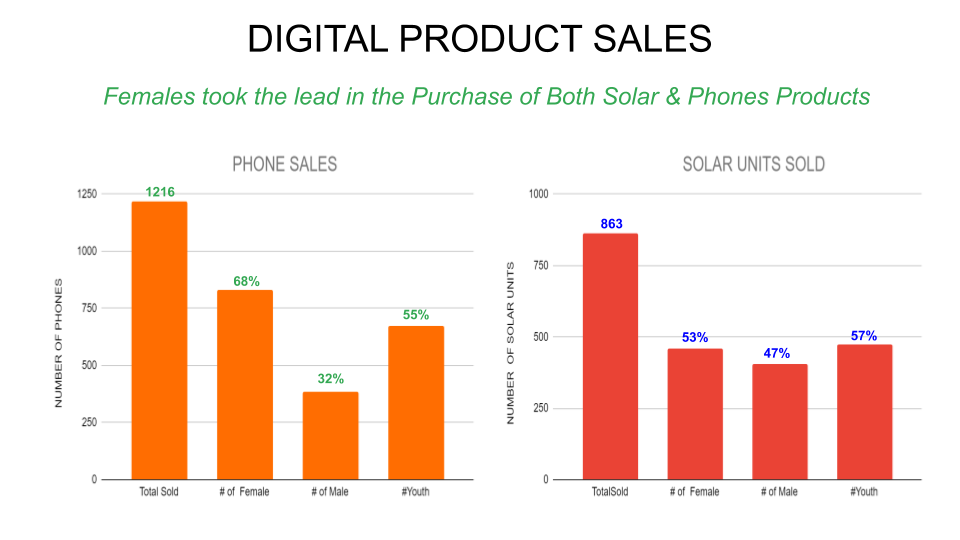Reaching the Last Mile: The Foundation for Growth of Uganda’s Digital Economy
Tags
“ You don’t think twice about buying a phone with this offer of an affordable phone together with the sim activation services”
-Joan Abejja,
on having a personal phone
While there is no doubt about the continuing growth of Uganda’s digital economy, there is still room for a fast-tracked and more inclusive digital growth.
A combination of limited access to digital solutions, low internet penetration and limited digital skills still hampers wider uptake and usage of digital solutions especially for people in rural communities.
At the height of the COVID-19 lockdown, a number of businesses in urban centers in Uganda such as Safeboda swiftly adapted their digital platforms to new frontiers so as to continue normal operations as well as venture into newer areas of business. As a matter of fact, a recent study by UNCDF and Makerere University, shows that many businesses have embraced digital innovation and are adjusting their business models to stay afloat in the wake of the COVID-19 pandemic.
However, many people, especially in the rural areas are still unserved and thus unable to enjoy. Owning a personal phone is something that Joan Abejja, who lives in Laropi village, 27km out of Moyo town, has always wanted but the transport costs and distance made that a distant dream.
To make life easier for people like Joan, UNCDF in partnership with MTN Uganda and Airtel Uganda, and Fintechs such as Ensibuuko Tech Ltd and Mobipay Agrosys Ltd, is working to increase access to digital products and services to underserved communities in the North and West Nile regions of Uganda. Working with partners, UNCDF uses the ‘Digital Community Entrepreneur Model’ that is built around recruiting youth within a community who have good business acumen and are trusted by the community to become ‘entrepreneurs.’ These adolescents are engaged in selling products like phones, airtime and data topups as well as mobile money services, on which they earn commissions.
“ You don’t think twice about buying a phone with this offer of an affordable phone together with the sim activation services” Abejja says. After a digital community entrepreneur brought it to her doorstep and registered it, Abejja paid only $10 for the phone that came with airtime worth $10, while avoiding the hustle of traveling 27kms and $3 transport fare.
Initiatives like these are part of UNCDF’s programme focused on building an inclusive digital economy that leaves no one behind in the digital era. The journey for improving people’s lives through access to digital services begins with creating an open environment for payments that lays the foundation for a levelled ground within the ecosystem to close the digital divide. Through a five-year grant from Sida, UNCDF is using a market systems development approach to leverage digital technologies as a catalyst to address market constraints in various sectors like agriculture, health and education.
In the agriculture sector, UNCDF is working to introduce innovative sustainable digital solutions that unlock the systemic constraints with the ultimate goal of improved access to timely and reliable information that will in turn improve the productivity of smallholder farmers and improve the lives and livelihoods of over 200,000 vulnerable families in West Nile, Kiryandongo and Northern Uganda. Additionally, usage of digital payments solutions will increase credit eligibility among farmers and provide them with access to financial services like credit and insurance.
Through this project, UNCDF empowers women and youth, who due to social and economic factors, are traditionally excluded from digital services. Indeed, initial results from our work with Ensibuuko indicate a better uptake of digital services by female farmers. More female farmers have taken financial and digital literacy training, purchased digital products like phones and solar products and registered for mobile money services.
The graph below on digital product sales in the West Nile region, in February and April 2020, shows that 68% of the phone purchases and 53% of solar purchases were done by women.

Digital product sales in the West Nile region
Access to digital solutions is a big deal to us. It means that farmers can now benefit from access to information on agricultural management practices, markets and farming technologies, digital financial services and are therefore able to increase their productivity. Such improved access to digital services has a multiplier effect that creates a positive impact on the lives of the most vulnerable people like smallholder farmers, women and youth in the rural communities.